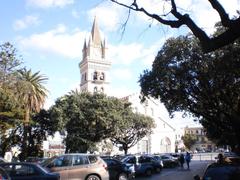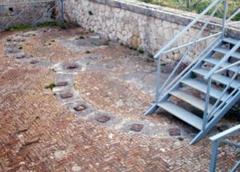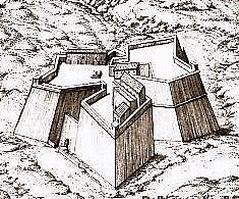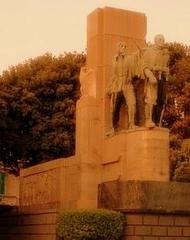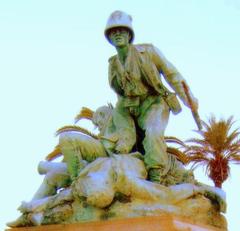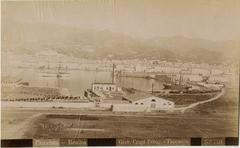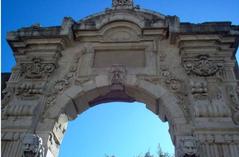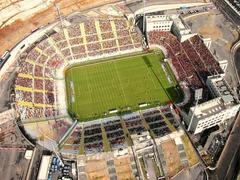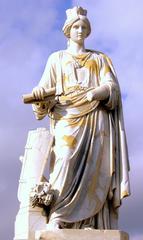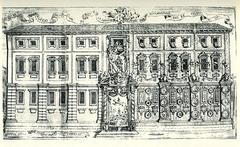
Messina Cathedral: Visiting Hours, Tickets, History, and Architectural Highlights
Date: 14/06/2025
Introduction
Messina Cathedral, or Duomo di Messina, stands at the heart of Sicily’s vibrant port city, bearing witness to centuries of history, faith, and artistic innovation. Revered for its Norman origins, magnificent façade, and the world’s largest astronomical clock, the cathedral is a focal point for spiritual life and cultural heritage in Messina. Whether you’re a history enthusiast, a religious pilgrim, or a traveler drawn by the grandeur of Mediterranean architecture, this guide provides everything you need to plan a memorable visit: up-to-date visiting hours, ticket details, accessibility information, and insider travel tips.
For official updates and detailed planning, always consult resources such as the Messina Cathedral official website and the Messina Tourism Board.
Historical Overview
Origins and Early Foundations
Messina’s roots stretch deep into the ancient world, serving as a crossroads for Greek, Roman, Byzantine, Arab, and Norman civilizations (Travel to Italy Guide). Christianity’s presence is linked to the Apostle Paul, believed to have visited Messina in 42 AD. The city’s enduring devotion to Madonna della Lettera is traced to a legendary letter said to have been sent by the Virgin Mary, promising protection for Messina (Learn Sicilian). The first church on the site likely dates to the Byzantine era, but the present cathedral was commissioned by the Normans and consecrated in 1197, quickly becoming one of Sicily’s most significant Norman monuments (Britannica).
Architectural Evolution and Reconstruction
Messina Cathedral’s architecture has been shaped by cycles of destruction and renewal. A fire in 1254 led to major reconstruction and the addition of a marble façade and new mosaics. The Baroque era saw further embellishments, and devastating earthquakes in 1783 and 1908 necessitated extensive rebuilding (Britannica). After World War II bombings, restorations faithfully preserved original Norman and Gothic elements, including the basilica plan, three-apsed east end, and intricate stonework (Travel Ask).
The Astronomical Clock and Bell Tower
Installed in 1933, the astronomical clock in Messina’s neo-Gothic bell tower is the largest and most complex mechanical clock in the world (Learn Sicilian). Each day at noon, mechanical figures animate scenes from Messina’s religious and civic history, drawing crowds to Piazza del Duomo (Fusetravels). The bell tower itself rises 60 meters, offering panoramic views of the city and the Strait of Messina.
Religious and Cultural Significance
The cathedral is a spiritual center, dedicated to Madonna della Lettera, with annual celebrations on June 3rd. It stands as the seat of the Archdiocese of Messina-Lipari-Santa Lucia del Mela, hosting solemn masses, processions, and traditional rites (Great Sicily). Its resilience through disaster and renewal embodies the enduring faith and identity of Messina’s people.
Visiting Messina Cathedral
Location and Accessibility
Located in Piazza del Duomo, Messina Cathedral is a short walk from the port, making it easily accessible for cruise passengers and city visitors alike (Travel to Italy Guide). The city’s center is walkable, with public transportation and taxis readily available. The main areas of the cathedral are wheelchair accessible, and ramps and elevators are provided for visitors with mobility needs (Ellie’s Travel Tips).
Visiting Hours
- Cathedral:
- Monday to Saturday: 7:30 am – 12:00 pm, 4:00 pm – 7:00 pm
- Sunday and public holidays: 7:30 am – 12:00 pm
- Bell Tower & Astronomical Clock:
- Generally open from 10:00 am to 1:00 pm; extended to 4:30 pm on select dates (MessinArte).
- Treasury Museum:
- Monday to Saturday: 10:00 am – 1:00 pm
Note: Hours may change for religious events or maintenance. Always check official sources before visiting.
Tickets and Entry
- Cathedral: Free entry
- Bell Tower & Astronomical Clock: €5 per person
- Treasury Museum: Modest fee applies
- Guided Tours: Typically €10 per person; advance booking recommended during peak seasons
- Group Visits (25+): Can be arranged in advance via the cathedral’s management
Tickets are available on-site or through the official website.
Visitor Tips
- Arrive before noon to secure a good view of the astronomical clock show
- Dress modestly (shoulders and knees covered)
- Non-flash photography is permitted except during services or in the treasury
- Multilingual audio guides and brochures enhance the experience for international visitors
- Restrooms and a gift shop are available onsite; cafés and seating in Piazza del Duomo
Architectural and Artistic Highlights
Exterior and Façade
The façade, rebuilt after the 1908 earthquake, preserves Norman-Gothic elements: three sculpted portals, intricate stone lacework, and statues of saints set in a play of Sicilian sunlight (Wikipedia).
Interior and Nave
The vast nave is divided by monolithic columns, leading to a luminous apse adorned with a mosaic of Christ Pantocrator. The wooden ceiling is decorated with biblical scenes, and light filtering from clerestory and rose windows creates a solemn, spiritual ambiance (The World of Sicily).
Pipe Organ and Sacred Art
The cathedral’s pipe organ, built in 1948, is the second largest in Italy, with five keyboards and 17,500 reeds (PlanetWare). The Treasury Museum houses masterpieces including the “Golden Manta” of Madonna della Lettera, Byzantine icons, and reliquaries from the 10th–17th centuries (The World of Sicily).
The Astronomical Clock
The daily noon spectacle features gilded statues moving to chimes and melodies, illustrating episodes from Messina’s history and Christian tradition (Facts.net). The bell tower also contains historic bells that survived the 1908 earthquake.
Religious Life and Events
The cathedral is a living center of worship, celebrating regular Masses and hosting major festivals such as the Feast of Madonna della Lettera (June 3rd) and the Feast of the Assumption (August 15th). During these events, expect large crowds and limited access to some areas (Great Sicily).
Nearby Attractions
- Fountain of Orion: Renaissance masterpiece in Piazza del Duomo
- Regional Museum of Messina: Artifacts and art from Messina’s history
- Church of Santissima Annunziata dei Catalani: Noted for its Arab-Norman architecture
- Waterfront Promenade and Fish Market: Authentic local experiences nearby
All are within easy walking distance of the cathedral (Travel to Italy Guide).
Frequently Asked Questions (FAQ)
Q: What are Messina Cathedral’s visiting hours?
A: Generally, 7:30 am to 12:00 pm and 4:00 pm to 7:00 pm. Bell Tower 10:00 am to 1:00 pm.
Q: Is there an entrance fee?
A: Cathedral entry is free; Bell Tower and Treasury Museum access require a ticket.
Q: Is Messina Cathedral wheelchair accessible?
A: Yes, the main areas are accessible. The bell tower climb is not.
Q: When is the astronomical clock show?
A: Every day at noon.
Q: Are guided tours available?
A: Yes, in multiple languages. Arrange via the cathedral or local tour operators.
Q: Is photography allowed?
A: Yes, without flash; restrictions apply during services and in some museum areas.
Travel Tips
- Visit in spring or autumn for pleasant weather and fewer crowds
- Arrive 15–30 minutes early for the clock show
- Wear comfortable shoes to navigate the cobblestone streets
- Respect religious services by visiting quietly during Mass times
Contact and Further Information
- Address: Via San Giacomo, 2 – 98122 Messina
- Phone/Fax: +39 090675175
- Email: [email protected]
- Official Website: MessinArte
Conclusion
Messina Cathedral is a must-see destination in Sicily, offering an inspiring blend of history, architecture, faith, and community life. Witness the daily marvel of the astronomical clock, explore sacred treasures, and absorb the city’s unique atmosphere in Piazza del Duomo. Plan your visit with updated resources, and consider joining a tour for deeper insight into this extraordinary monument.
For curated travel guides, event updates, and interactive maps, download the Audiala app and follow us on social media. Make your journey to Messina Cathedral an unforgettable highlight of your Sicilian adventure!
Sources and Further Reading
- This is a sample text. (https://learnsicilian.com/blog/messina-cathedral-and-the-astronomical-clock/)
- This is a sample text. (https://fusetravels.com/europe/what-to-do-in-messina-sicily/)
- This is a sample text. (https://www.travelingitalian.com/blog/things-to-do-in-messina/)
- This is a sample text. (https://www.messinarte.it/en/)
- This is a sample text. (https://www.britannica.com/place/cathedral-of-Messina)
- This is a sample text. (https://traveltoitalyguide.com/why-is-messina-famous/)
- This is a sample text. (https://travelasker.com/top-rated-tourist-attractions-in-messina/)
- This is a sample text. (https://www.planetware.com/tourist-attractions-/messina-i-si-me.htm)
- This is a sample text. (https://www.theworldofsicily.com/en/sights/sights-of-messina/messina-cathedral/)
- This is a sample text. (https://www.elliestraveltips.com/cruise-port-messina/)
- This is a sample text. (https://www.understandingitaly.com/messina.html)
- This is a sample text. (https://eternalarrival.com/things-to-do-in-messina-sicily/)
- This is a sample text. (https://www.great-sicily.com/post/exploring-messina-a-hidden-gem-of-sicily)
- This is a sample text. (https://www.sightseeing-experience.com/magazine/uncovering-messinas-rich-past-and-its-role-as-sicilys-gateway/)
